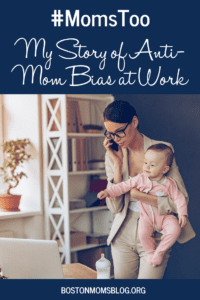“I know you aren’t even married yet, but are you planning to have children?”
He paused, then laughed, “I think it might be illegal to ask you that.”
It IS illegal.
Nevertheless, the male vice president at my company asked that question in my annual review just before my wedding. A year later, I was pregnant. During an all-staff lunch, this same person announced that two people were hired to help with my workload during my maternity leave. These people, being men, “are unlikely to get pregnant any time soon,” he said.
This statement caused a silent uproar around my office.
At some point over the next few days, all of my co-workers (with the exception of senior leadership) approached me, expressing outrage over these comments. Human resources spoke to me, asking if I could continue to work with that vice president. I felt like I was being held responsible for his actions.
“Bias against mothers is one of the strongest forms of bias against women.”
This quote from Liz Morris, deputy director of the Center for Worklife Law, appeared in a recent New York Times opinion piece by Katherine Goldstein. The author reports that anti-mom bias is a systemic problem. Research shows that mothers are passed over for jobs, despite equal qualifications, and they earn less money. Goldstein describes instances in which promised compensation was denied, promotions weren’t given, and women were fired. All because they were pregnant or were mothers.
A week after the all-staff lunch, I went into pre-term labor and was put on bed rest for the remainder of my pregnancy. I strongly believe that it was largely due to the stress of this situation. Prior to my unexpected leave, I’d been approved as an expert trial witness for the federal government. During bed rest, I saw that project go to the man who had made the anti-pregnancy comments. No one asked me before they took that career-boosting project away. My last promotion and merit-driven salary increase were in 2013. Right before I became a mom.
But you know what? Part of that was my fault. Because I am also guilty of anti-mom bias.
I came back to work on a part-time basis after my first daughter was born. I continued that schedule after the birth of my second daughter. And here are some things I’ve said since returning to work:
In relation to promotions: “I’m not trying to get ahead right now, I’m just trying to stay afloat.”
Because I do school pickup: “I’m not the best employee because I can’t make afternoon meetings or conference calls.”
I spoke at a conference and had to bring my infant daughter with me. Conference organizers praised my presentation to a colleague, and I responded with: “Oh, they just liked me because I brought my baby.”
I’m a clear offender of anti-mom bias — toward myself. I’ve completely discounted my own abilities, expertise, and commitment to doing great work for my clients all because I’m a mom.
My attitude has hurt me as well as all other moms in the workplace.
But that changed this year, for a number of reasons. Yes, anti-mom bias from others has held me back, but I’ve also held myself back. I don’t want to do that anymore. Instead, I’m advocating for myself, and in doing that, advocating for working moms everywhere. And it’s not enough to change attitudes for the sake of my daughters. I want attitudes to change now, so that working women who are pregnant or already mothers don’t have to fight these same battles. Goldstein states, “But it’s also noteworthy to me that we’ve never had a high-profile case or national discussion about discrimination against mothers, one that begins to raise in the collective consciousness the notion that this kind of discrimination is wrong and truly harmful. . . . If the dam of silence ever starts to break, I believe we’ll soon begin to hear a lot of mothers saying #MomsToo.”
I’m saying it now. Loudly. #MomsToo.















This is great!